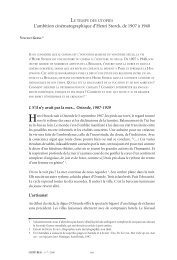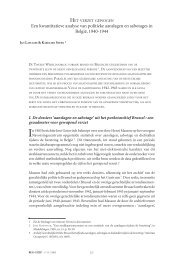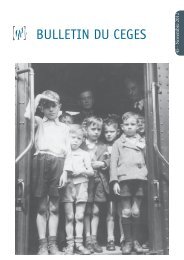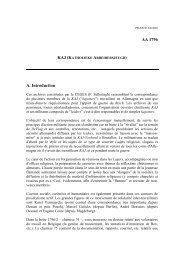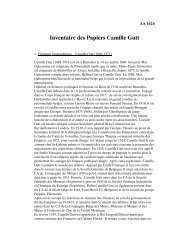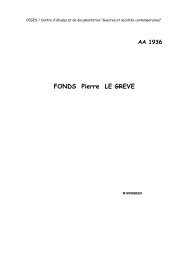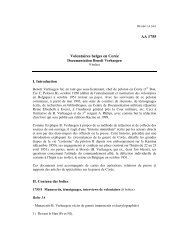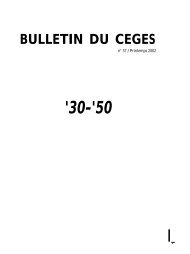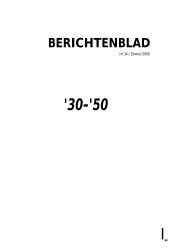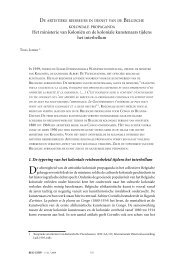Artsen Zonder Grenzen-België, genese van een atypische NGO ...
Artsen Zonder Grenzen-België, genese van een atypische NGO ...
Artsen Zonder Grenzen-België, genese van een atypische NGO ...
You also want an ePaper? Increase the reach of your titles
YUMPU automatically turns print PDFs into web optimized ePapers that Google loves.
Samenvattingen / Résumés / SummariesKOEN AERTSTHE REPRESSION OF COLLABORATION IN BELGIUMAFTER THE SECOND WORLD WARRepresentation and ResearchIn Belgium, the repression which occurred after the Second World War for a longtime remained more a subject of social debate than of (academic) historical research.The attempts made to confine the wartime past within a national official discoursesoon proved to be fruitless. Instead, the dominant perception of the repression ofcollaboration was at the outset nothing more than a Flemish nationalist construction.According to this account, the repression was perceived as simply a Belgian or evenfrancophone act of revenge against the Flemish movement. In this way, the conceptof victimhood was actively politically cultivated, and became an integral element of aclaim to a distinct identity.This dominant interpretation was only successfully broken in the 1980s. The broadcastsof Maurice De Wilde on the New Order challenged this monotone Flemish (nationalist)discourse. The violent polemics to which this gave rise on the television, as well as theopinion pieces and readers’ letters published in the press, demonstrated the need forserious historical research on this element of the past. It was at this time that scientifichistorical research began in various Belgian universities on the subject of the wartimepast. At the Catholic University of Leuven, Luc Huyse, Steven Dhondt and theircollaborators undertook the research which resulted in the publication of the firstfundamental and scientifically based study of the repression of collaboration in 1991.As (legal) sociologists, they concluded that Belgium was suffering from an illness rootedin its wartime past; a conclusion that appeared to be reinforced in the same year by theelectoral success of the extreme right in Flanders. Thus, they concluded that Belgium wassuffering from a trauma. At both the legislative and scientific levels, efforts were madeto identify remedies to this problem. At the federal level, the law against negationismwas passed in 1995, while the Flemish Parliament passed some resolutions in 2002concerning how the nature of the wartime past should be confronted. In this way, thetrauma appeared in some respects to have b<strong>een</strong> assuaged at both the social and politicallevels. Through the rejection and condemnation of its guilty past, so Flanders appearedable to enter the twenty-first century on a more healthy basis.In this way, the debate lost some of its rele<strong>van</strong>ce, and the emphasis on the failure toconfront the past gave way to new subjects and methods of approach which confronted aless evident past, regardless of whether it was carried out with a consciously comparativeinternational perspective. The nationalist instrumentalisation of the past, be it in thename of Belgium or of Flanders, was replaced by a more historical approach, whichparadoxically gave rise, at least among academic historians, to a broad consensus, whichemphasised the black nature of the wartime past and its liquidation. Increasing attention314



